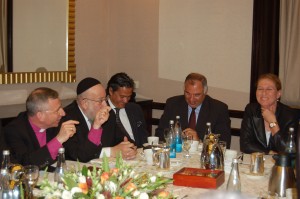httpv://youtu.be/Se7RWVK93qE
A delegation of the Council of Religious Institutions of the Holy Land visited Washington to speak with administration officials and congressional leaders about the role religious leaders can play in Middle East peace-making. Here Bishop Munib Younan of the Evangelical Lutheran Church in Jordan and the Holy Land and Patriarch Fouad Twal, the Latin Patriarch of the Holy Land and Jordan, talk with Churches for Middle East Peace Executive Director Warren Clark about the Christian presence in the Holy Land and the role of the Council in the Holy Land. Bishop Younan outlines 4 things people can do to help: 1) strengthen Christian institutions in the Holy Land; 2) build community-based education; 3) create jobs; 4) build affordable housing.
Peace in the Holy Land is a necessity – and possible. So said the delegation from the Council of Religious Institutions of the Holy Land who visited Washington DC this week to speak to high level administration officials, congressional leaders and interested lay people. The group, made up of top Christian, Muslim and Jewish leaders in the Holy Land, have been working together since 2005 toward mutual understanding and ultimately to bring a just peace to their beloved land.
They spoke to Vice President Joe Biden for an hour and a half, and spoke Tuesday at the United States Institute of Peace in Washington, stressing the role of education in peace-making. I have asked for a transcript of the panel to be put up at http://www.usip.org/events/preventing-incitement-and-promoting-peace, but don’t know if that is possible.
A written statement from their delegation states that their goals for this visit include advocating for equal, free access to all holy sites and for respecting all three narratives of Jerusalem, Jewish, Christian and Muslim. The council speaks out regularly against incitement and has commissioned a study of Palestinian and Israeli textbooks to monitor and hopefully lead to change of material deemed to incite hatred and racism. The council is also working to launch a project to prepare emerging religious leaders to enable them to also work cooperatively toward a just peace.
They say that religious leaders can and should be a great help to address entrenched issues that touch on both religion and politics, and are ready and eager to be of service.
Read their full statement of goals and a message from this delegation.

